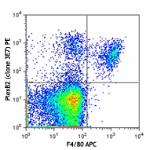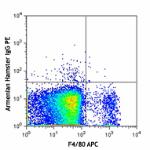- Clone
- 3E7 (See other available formats)
- Regulatory Status
- RUO
- Isotype
- Armenian Hamster IgG
- Ave. Rating
- Submit a Review
- Product Citations
- publications
| Cat # | Size | Price | Quantity Check Availability | Save | ||
|---|---|---|---|---|---|---|
| 145901 | 50 µg | 124 CHF | ||||
Plexin B2 is a 240 kD transmembrane receptor belonging to the semaphorin receptor family, B subfamily. All the family members share an extracellular semaphorin domain and an intracellular plexin domain-containing tail that can mediate intracellular signaling. Distinct from the other subfamily members, Plexin B2 contains an intracellular domain with a PDZ motif (post synaptic density protein (PSD95), Drosophila disc large tumor suppressor (DlgA), and zonula occludens-1 protein (zo-1)), which can relay extracellular signals to intracellular motifs. Similar to the other B family members, Plexin B2 was also originally found in the nervous system and was later reported on endocrine, reproductive, urinary, digestive, respiratory, and immune systems. In immune cells, Plexin B2 is highly expressed on macrophages, conventional dendritic cells (cDCs), and plasmacytoid dendritic cells (pDCs). It is also expressed on T cells and T-dependent germinal center B cells. Plexin B2 facilitates ligand induced cell guidance and migration in the nervous system, and induces cytoskeletal changes in overexpression assays through RhoGTPase. However, the function of Plexin B2 in the immune system is not conclusive. Plexin B2 has been reported to modulate upon activation of DCs by TLR ligands, TNF-α, and anti-CD40. It also functions as a negative regulator of Rac and Cdc42 and modulates cell motility in macrophages. Plexin B2 has been found to have several semaphorin ligands including Semaphorin-3E, Semaphorin-4A, Semaphorin-4C, and Semaphorin-4D.
Product DetailsProduct Details
- Verified Reactivity
- Mouse
- Antibody Type
- Monoclonal
- Host Species
- Armenian Hamster
- Immunogen
- PAM 2-12 keratinocyets cell line
- Formulation
- Phosphate-buffered solution, pH 7.2, containing 0.09% sodium azide.
- Preparation
- The antibody was purified by affinity chromatography.
- Concentration
- 0.5 mg/ml
- Storage & Handling
- The antibody solution should be stored undiluted between 2°C and 8°C.
- Application
-
FC - Quality tested
- Recommended Usage
-
Each lot of this antibody is quality control tested by immunofluorescent staining with flow cytometric analysis. For flow cytometric staining, the suggested use of this reagent is ≤1.0 µg per million cells in 100 µl volume. It is recommended that the reagent be titrated for optimal performance for each application.
- Product Citations
-
- RRID
-
AB_2562091 (BioLegend Cat. No. 145901)
Antigen Details
- Structure
- Contains an extracellular semaphorin domain and an intracellular plexin domain-containing tail; intracellular domain has a PDZ motif (PSD95, DlgA, and zo-1)
- Distribution
-
Macrophages, dendritic cells, T cells, T-dependent germinal center B cells
- Function
- Involved in cell motility, modulate dendritic cells
- Ligand/Receptor
- Semaphorin-3E, Semaphorin-4A, Semaphorin-4C, and Semaphorin-4D
- Cell Type
- B cells, Dendritic cells, Macrophages, T cells
- Biology Area
- Cell Biology, Cell Motility/Cytoskeleton/Structure, Immunology, Innate Immunity, Neuroscience, Synaptic Biology
- Molecular Family
- Adhesion Molecules, Semaphorin Receptors
- Antigen References
-
1. Roney K, et al. 2011. PLoS One 6:e24795.
2. Worzfeld T, et al. 2004. Eur. J. Neurosci. 19:2622.
3. Raper JA, et al. 2000. Curr. Opin. Neurobiol. 10:88.
4. Artigiani S, et al. 2003. J. Bio. Chem. 278:10094. - Gene ID
- 140570 View all products for this Gene ID
- UniProt
- View information about Plexin B2 on UniProt.org
Related Pages & Pathways
Pages
Related FAQs
Other Formats
View All Plexin B2 Reagents Request Custom Conjugation| Description | Clone | Applications |
|---|---|---|
| Purified anti-mouse Plexin B2 | 3E7 | FC |
| PE anti-mouse Plexin B2 | 3E7 | FC |
Compare Data Across All Formats
This data display is provided for general comparisons between formats.
Your actual data may vary due to variations in samples, target cells, instruments and their settings, staining conditions, and other factors.
If you need assistance with selecting the best format contact our expert technical support team.
-
Purified anti-mouse Plexin B2
-
PE anti-mouse Plexin B2

C57BL/6 mouse splenocytes were stained with F4/80 APC and Pl... 

 Login / Register
Login / Register 







Follow Us